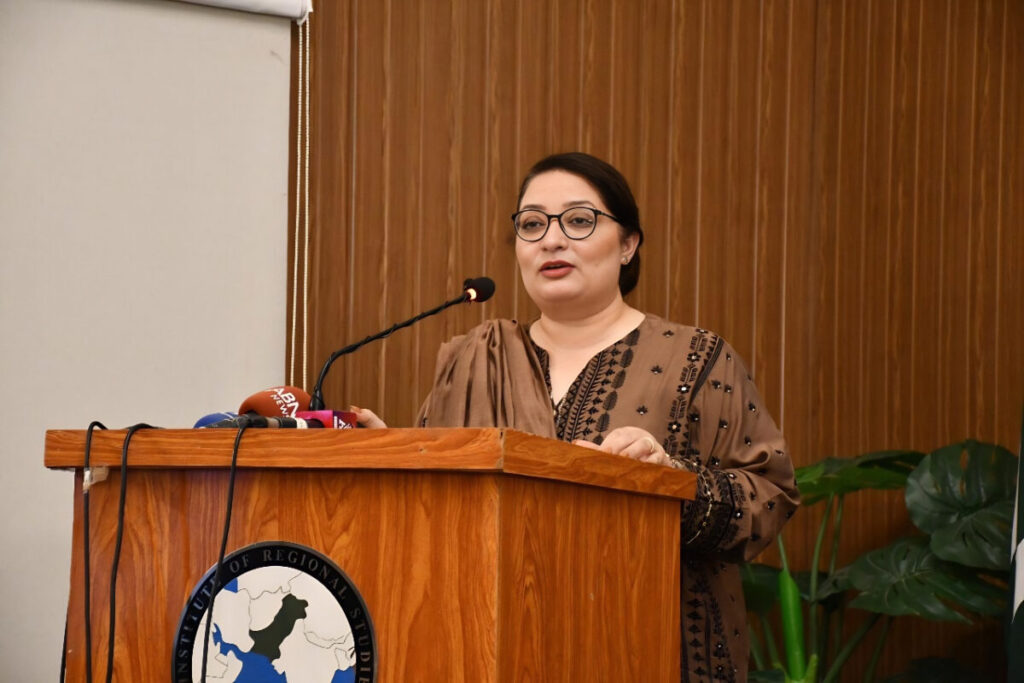Islamabad, Sep 19: Romina Khurshid Alam, the Prime Minister’s Coordinator for Climate Change and Environmental Coordination, stated on Thursday that the Chinese people-centric government model is a potent paradigm that promotes development driven by the people, poverty reduction, and technical innovation.
She was speaking at the Institute of Regional Studies (IRS) and the Asian Institute of Eco-Civilization, Research and Development (AIERD) here at the IRS at the Dialogue for People-centric Governance System: A Case Study of China seminar.
According to PM’s aide Romina Khurshid, for a sustainable future, human growth must be combined with environmental and natural conservation for the common welfare of both Pakistan and China. Both countries must learn from each other’s experiences.
“China offers a valuable lesson on how to combine robust governance with citizen participation. It’s a potent approach that promotes technical progress, advancement, and poverty alleviation,” she remarked.
She emphasized that although China had never taken a condescending stance toward other countries in this area, it has always supported women’s rights and empowerment in every sphere of its life, including commerce, industry, social life, and politics.
The PM’s assistant emphasized that women participate in every industry in China and hold various positions of achievement. She praised the Chinese government’s paradigm of policy, which ensures that agriculture, health, and other vital industries are widely supported, thriving, and have bright future prospects.
She said that Pakistan was also making progress toward climate-friendly and people-centered development through the National Climate Change Policy and Adaptation Plan, while the Green Pakistan Programme and Recharge Pakistan projects concentrated on community development, forest conservation, and floodwater management using a variety of community-based approaches.
Romina Khurshid Alam stated, “We are focusing our environmental policies through people centric approach based on green employment and development.” The conversation was chaired by CEO of AIERD Shakeel Ahmed Ramay, while President IRS and Ambassador Jauhar Saleem invited speakers and attendees to share their varied viewpoints on China’s progress and development over time.
The public good is the actual core of people-centric administration, according to former Pakistani envoy to China Ambassador Moin ul Haque, because it is about helping rather than controlling the populace.
He also mentioned the Chinese development model, which was founded on the ideas of Confucius and placed a strong focus on leadership and the qualities of kindness, justice, wisdom, and loyalty.
“China has developed at a faster rate than any other nation in such a short amount of time. With the goal of assisting its citizens, the Chinese made investments in technologies related to health, medicine, pollution prevention, and environmental preservation. China’s poverty alleviation study is a case study to learn for enhancing social security and poverty alleviation measures for Pakistan, he said. It lifted 800 million people out of poverty.
Dr. Syed Kaleem Imam, a former Inspector General of Police, emphasized Pakistan’s people-centric governance initiatives. According to him, people-centric governance puts the welfare and improvement of the general public first through more effective and efficient service delivery.
“While the Citizen’s Portal, right to information laws, community policing models like Police Khidmat Markaz, and Police Reforms are the significant steps towards people centric governance,” the speaker stated, “e-governance initiatives like online NADRA and taxation facilities reduced bureaucratic red tape.”
The main obstacles to guaranteeing people-centric governance, however, were the inconsistent application of laws, a lack of understanding, the digital divide, and ineffective local governments. To address these issues, digital infrastructure development and public involvement in policymaking were crucial.
The emergence of China, according to Dr. Sajid Amin Javed, Deputy Executive Director of the SDPI, was predicated more on economics than politics. “Pakistan must take a cue from China: investing in economic growth and development will make the country stronger politically,” he declared.
He said, “China invested in people first to train them on utilizing modern infrastructure and then developed infrastructure as it’s useless sans skills development of masses to utilize it.” Regional prosperity and the abolition of widespread disparities, he said, were essential for progress.Pakistan needs to improve its national statistical system and adopt a data culture.
Timely data access and the ability to convert figures into policy documents. Dr. Shi Yuanqiang, Minister and Deputy Chief of Mission at the Chinese Embassy, expressed gratitude to the AEIRD and IRS for their efforts in facilitating discussions about the Chinese model of development and people-centric governance.
“A new era of economic development and advancement has begun with the 18th national Congress of China’s communist party, and people-centric governance needs to be taken seriously as an approach for people-focused governance. “He stated, “Life expectancy in China is 78.6 years, and the country has ensured ecological and environmental conservation. People in China have access to medical care and health insurance.”
According to him, China now possesses the world’s largest forested regions and the fastest-improving air quality. Additionally, 26.4% of all energy produced is derived from renewable sources. He claimed that while the Chinese people feel more strongly that they are part of the policy-making process, the entire process emphasizes collaboration between the people and the government.
He continued, “CPEC has brought in a significant amount of investments and jobs, which have changed Pakistan’s conditions significantly.” In his vote of gratitude, President IRS Ambassador Jauhar Saleem stated that the speakers’ emphasis on key points resulted in a very instructive session full of ideas and insights.
He stated that Pakistan could learn a lot from China about excellent administration that takes into account the demands of the people. The speaker emphasised the need of gaining knowledge from successful models in friendly nations and global best practises. Pakistan, in particular, needs solid governance and meritocracy, which is the main takeaway from the Chinese model since it places the greatest focus on it.
